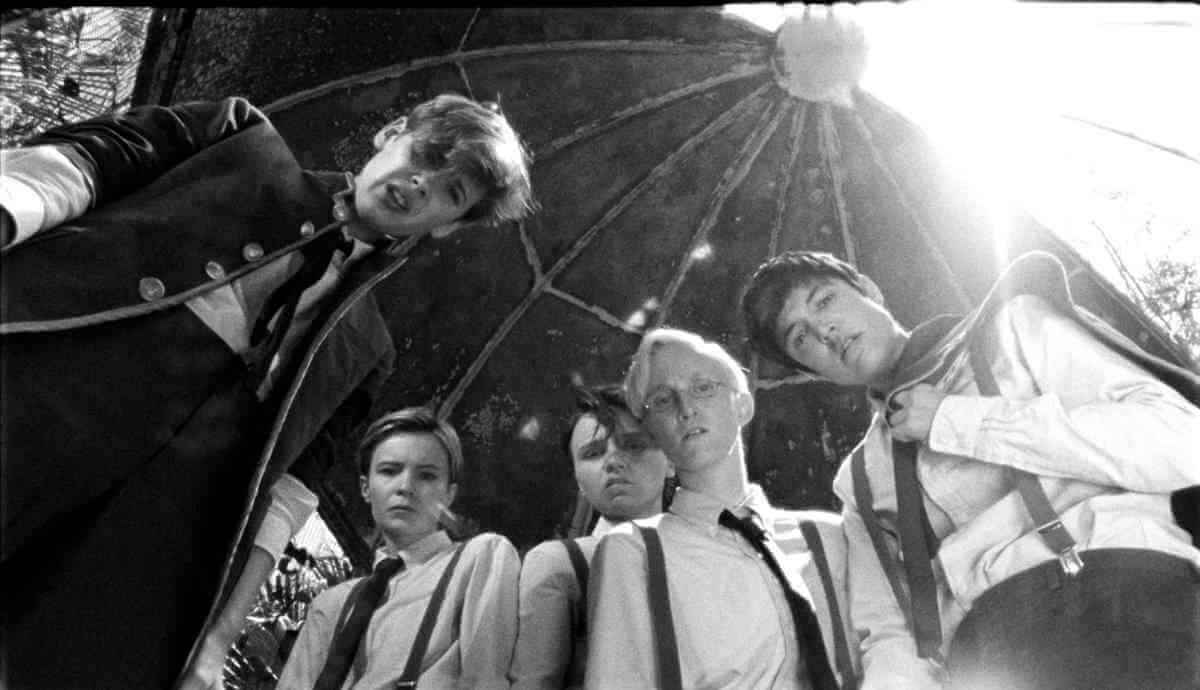Bertrand Mandico makes an auspicious feature film debut with his audacious fantasia “The Wild Boys.” Shot on 16mm, and mostly in luminous black and white, the film recounts the story of Tanguy (Anaël Snoek) and his friends, who are dubbed “wild boys.”
Five young men — Romuald (Pauline Lorillard), Jean-Louis (Vimala Pons), Hubert (Diane Rouxel), Sloane (Mathilde Warner), and Tanguy — are all played by young women who wear schoolboy uniforms that mask their breasts and whose hair is cut in mannish styles. They are defiant troublemakers who sexually assault a teacher (Nathalie Richard) — a heinous crime that puts them on trial. In court, they claim “TREVOR” — “a deity of chaos they can’t control” — was responsible. (TREVOR is mentioned again in the film, but never seen or fully explained, for better or worse.)
The wild boys are sentenced to set sail with a Dutch captain (Sam Louwyck), who will transform them into civilized and docile beings. He ties them up on board the ship and forces them to eat hairy fruit — imagine swallowing a plum covered in pubic hair.
“The Wild Boys” is full of inventive and imaginative elements, which counterbalance the lack of plot. When the film tries to create drama — as when Hubert spies the captain reuniting with Séverine (Elina Löwensohn) — the payoff never comes. Séverine, a woman who dresses as a man, talks about a “feminized world” where women will rule. But this storyline about female power feels underdeveloped. Likewise, the captain’s efforts at civilizing the boys is overshadowed by the fantastical elements and transformations that occur when the ship stops on an island.
Mandico focuses on creating a heady, dreamlike atmosphere that is both beautiful and disturbing. There are surreal moments — a color fantasy sequence featuring a beast with glowing eye, as well as the arrival of an animal that wears a human mask. “The Wild Boys” is also often erotically charged, including a lengthy lovemaking sequence where four of the boys get drunk and cuddle and hump each other in slow motion as feathers fly through the air and coat their bodies. Scenes that play with gender — with characters living in an “in between” state of male and female, or the boys sucking on a phallus-shaped plant that causes them to experience a feverish delirium — range from pornographic to downright hilarious.
Despite the polymorphous perversity on display, Mandico’s playful and alluring visuals dilute Mandico’s themes of feminism and toxic masculinity. What is more, there is too little emotion generated by the action. It is hard to care about the characters, and the five boys seem almost interchangeable. Tanguy is most identifiable in part because he is blond and introduced first. That said, the five lead actresses are each up to the challenge of their gender-bending roles. Watching them act out their masculinity and femininity is amusing, especially as they navigate sexuality and body dysmorphia.
In support, Louwyck is appropriately gruff as the captain, and he makes for an interesting foil for the wild boys. His performance swings from being controlling to becoming the victim of a mutiny. Löwensohn is captivating as Séverine, though she has too little to do in what should have been a stronger role.
But “The Wild Boys” is not meant to be an actor’s showcase. Its magic comes from its wondrous visuals, which engage the mind and make this queer fantasy memorable.
THE WILD BOYS | Directed by Bertrand Mandico | Altered Innocence | In French, with English subtitles | Opens Nov. 15 | Anthology Film Archives, 32 Second Ave. at Second St. | anthologyfilmarchives.org



































